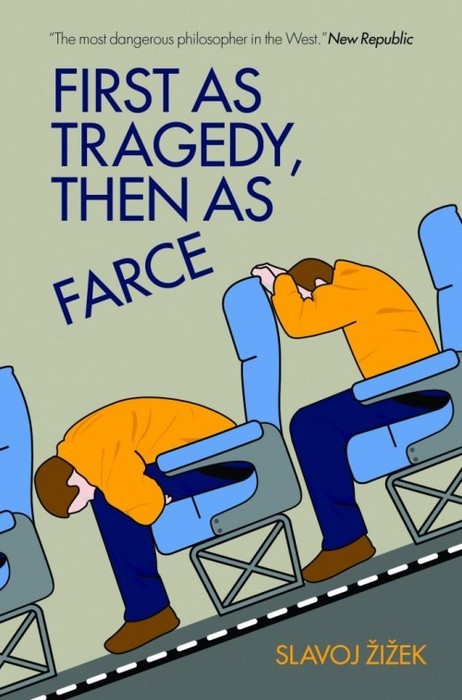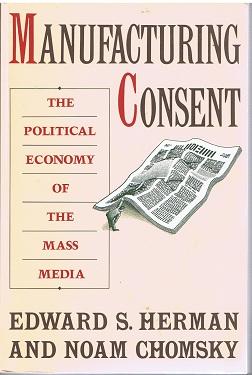Slavoj Zizek: First As Tragedy, Then As Farce (2009)
Filed under book | Tags: · capitalism, commons, communism, globalisation, propaganda, socialism

From the tragedy of 9/11 to the farce of the financial meltdown
In this bravura analysis of the current global crisis following on from his bestselling Welcome to the Desert of the Real, Slavoj Zizek argues that the liberal idea of the “end of history,” declared by Francis Fukuyama during the 1990s, has had to die twice. After the collapse of the liberal-democratic political utopia, on the morning of 9/11, came the collapse of the economic utopia of global market capitalism at the end of 2008.
Marx argued that history repeats itself “occuring first as tragedy, the second time as farce” and Zizek, following Herbert Marcuse, notes here that the repetition as farce can be even more terrifying than the original tragedy. The financial meltdown signals that the fantasy of globalization is over and as millions are put out of work it has become impossible to ignore the irrationality of global capitalism. Just a few months before the crash, the world’s priorities seemed to be global warming, AIDS, and access to medicine, food and water — tasks labelled as urgent, but with any real action repeatedly postponed.
Now, after the financial implosion, the urgent need to act seems to have become unconditional — with the result that undreamt of quantities of cash were immediately found and then poured into the financial sector without any regard for the old priorities. Do we need further proof, Zizek asks, that Capital is the Real of our lives: the Real whose demands are more absolute than even the most pressing problems of our natural and social world?
Publisher Verso, 2009
ISBN 1844674282, 9781844674282
Length 96 pages
PDF (updated on 2012-4-15)
Comment (0)Denis McQuail, Peter Golding, Els de Bens (eds.): Communication Theory and Research: An EJC Anthology (2005)
Filed under journal | Tags: · cyberfeminism, infotainment, internet, journalism, mass media, propaganda, television

This exciting collection of papers represents some of the finest communications research published during the last decade. To mark the 20th anniversary of the European Journal of Communication, a leading international journal, the editors have selected 21 papers, all of which make significant and valuable interventions in the field of media and communications.
The volume is prefaced with an introduction by the editors and will be a central research text for scholars in this field.
Publisher SAGE, 2005
ISBN 1412918332, 9781412918336
306 pages
PDF (updated on 2013-6-5)
Comment (1)Edward S. Herman, Noam Chomsky: Manufacturing Consent: The Political Economy of the Mass Media (1988/2002)
Filed under book | Tags: · mass media, political economy, politics, propaganda, war

In this pathbreaking work, now with a new introduction, Edward S. Herman and Noam Chomsky show that, contrary to the usual image of the news media as cantankerous, obstinate, and ubiquitous in their search for truth and defense of justice, in their actual practice they defend the economic, social, and political agendas of the privileged groups that dominate domestic society, the state, and the global order.
Based on a series of case studies—including the media’s dichotomous treatment of “worthy” versus “unworthy” victims, “legitimizing” and “meaningless” Third World elections, and devastating critiques of media coverage of the U.S. wars against Indochina—Herman and Chomsky draw on decades of criticism and research to propose a Propaganda Model to explain the media’s behavior and performance. Their new introduction updates the Propaganda Model and the earlier case studies, and it discusses several other applications. These include the manner in which the media covered the passage of the North American Free Trade Agreement and subsequent Mexican financial meltdown of 1994-1995, the media’s handling of the protests against the World Trade Organization, World Bank, and International Monetary Fund in 1999 and 2000, and the media’s treatment of the chemical industry and its regulation. What emerges from this work is a powerful assessment of how propagandistic the U.S. mass media are, how they systematically fail to live up to their self-image as providers of the kind of information that people need to make sense of the world, and how we can understand their function in a radically new way.
Publisher Pantheon Books, 2002
ISBN 0375714499, 9780375714498
Length 412 pages
More info (wikipedia)
More info (publisher)
More info (google books)

